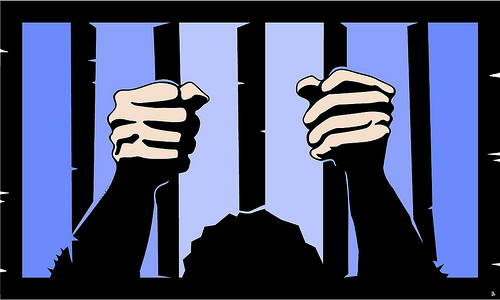
By Amalia Deloney, The Center for Media Justice
Prison inmates are often charged egregious rates just to be able to talk to their families. For several reasons this affects Latinos more than other groups. Recently Alex Nogales, President and CEO of the National Hispanic Media Coalition (NHMC), spoke to this very issue:
Some at the Commission have made strong statements about the exorbitant, predatory rates that phone companies charge the families of prison inmates for phone calls — an issue that disproportionately impacts many African-American and Latino families that can least afford it — indicating that a positive change may be within reach.
Nogales mentioned the issue in his keynote address at the Federal Communications Commission’s (FCC) annual Hispanic Heritage Month Celebration in Washington, D.C. The event also included a roundtable discussion between FCC representatives and leaders of major Latino led and serving organizations — including the Media Action Grassroots Network (MAG-Net).
On the table were a wide range of media and telecommunications issues that impact the Latino community: ownership, diversity, affordability and access (to name a few) as they relate to TV, radio and the wired and wireless Internet. Nogales’ remarks at the event couldn’t have been more perfect. Not only did they tie frame the prison phone calls as a Latino issue, he highlighted the powerful work that grassroots groups across the country have been doing.
While phone rates in prisons vary, in several states it costs $15 for a 15-minute collect call. Cricket, for example, offers a $55/month unlimited everything plan for the iPhone — this means folks on the outside can talk as much as they want for $55 a month, while families communicating with someone in prison can talk for 45 minutes for the same price. This is obviously predatory pricing, but that guarantees a hefty profit margin for the prison phone companies whose business model thrives off the incarcerated.
Latino and black communities are unduly affected — left to pay a regressive tax just to “stay together.” Latinos make up 35% of the U.S. prison population and the vast majority of the 400,000 migrants currently in detention centers. Of the 2.7 million children who have one or both parents behind bars — 1 in 28 is Latino. Though incarcerated or detained, these individuals all have family, friends, lawyers and case workers who want (or need) to stay in contact with them — and are forced to pay the monopoly rates.
As Latinos we understand the importance of family, it’s far more than just a shared bloodline — it’s a social and communal anchor that helps to define our aspirations, as well as our experiences and needs. Consistent communication is part of how we strengthen our family, and by extension our community as a whole. When this open communication is threatened—or worse yet, commoditized—we all pay the price.
MAG-Net — together with Prison Legal News and Working Narratives — leads the national Campaign for Prison Phone Justice. Since 2010, this campaign has mobilized thousands of incarcerated individuals and their families, criminal justice and civil rights advocates, media makers and activists from across the country to lower the lost of calls from prison.
Earlier this year the leaders of Latinos for Internet Freedom passed a resolution at the National Latino Congreso calling for “Phone Justice for Immigrants in Detention.” And, in the past three months alone, MAG-Net members have conducted in-district visits in California, New York, West Virginia and Minnesota, securing the support of key elected officials of color. Like us, they understand the burden that our communities bear to remain connected.
Take a minute and join our Campaign for Prison Phone Justice and let the FCC know that Latinos care about this issue. We are also supporting the film “Middle of Nowhere,” which speaks to this issue.
[Image Via vectorportal]






